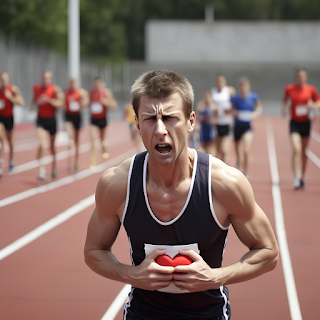Overtraining Syndrome dishearten sportsperson: Keynotes and defensive tactics
Energetic
and active persona is a watchword for sports persons. Players undergo rigorous
training to outshine in their sporting skills and qualify for national or
international tournaments. During training sessions, sportspeople are devoted
to improving their inner knack to prove themselves as an excellent player. In a
competitive sports environment, athletes give overtraining to their body and
shorten the resting period which may dangerously impact on their physical as
well as mental health. Excessive exercise and practice that results in fatigue
is termed as overtraining syndrome.
In
the sports arena, over training puts a mental burden on players and may drop the
athlete's performance in tournaments. It will take a long time to revive from
the poor health of players. When players are gripped under overtraining
syndrome, they experience excessive tiredness, mood swings, and irregular
sleep. Other negative consequences of overtraining syndrome are physiological
and psychomotor retardation, low appetite, weight loss, insomnia, muscle agony
and mental health issues such as depression and tension.
Typical
Sports that judge performance of players on the basis of races or
time trials are vulnerable to overtraining syndrome. These include running,
swimming and cycling. Sports people may detect their unusual body conditions
through observing their physical activities. If they do not compete the
sporting performance at previous level, it shows that their body is under
fatigue and needs proper rest. Players who undergo overtraining syndrome may
experience heavy leg muscles when doing lower intensity physical exercises.
Performance in competitive sports will decline when players suffer from
overtraining syndrome. Sometimes over training syndrome is threatening to
sports people because it can lead to injury, sickness, and permanent damage to
the body in the physiological system.
Caution
word for sportsperson:
Many sports persons visualize excessive training as a sport asset to succeed
among competitors. Players need proper guidance and quality education to
improve their performance through balancing their training and resting period.
Sportspeople must be well informed about overtraining syndrome when enrolled
for practice sessions for sports so that they can assess their capability
during training and take proper rest to boost their performance in actual
matches or tournaments.
To
manage overtraining syndrome, athletes must closely monitor vital heart
parameters. Regular monitoring of heart rate after performing sports exercise
and at rest period will help them to know about body condition. If they observe
irregularity in heart rate at rest, it is an indication for susceptibility of
overtraining syndrome. Players must be cautious and seek advice from health
care providers. To recover from overtraining syndrome, athletes must take
nutritious diet to strengthen body tissues, sleep well and adopt stress
management tactics to assuage mental strain elevated due to overtraining.
Disclaimer:
Above
article is the reflection of the writer's view and based on environmental
input. The above information is not for any treatment purpose or medical
advice. Any players suffering from above syndrome must contact health
experts. Any resemblance of writeup is just a coincidence. Writer is not
responsible for any disagreement.


Comments
Post a Comment